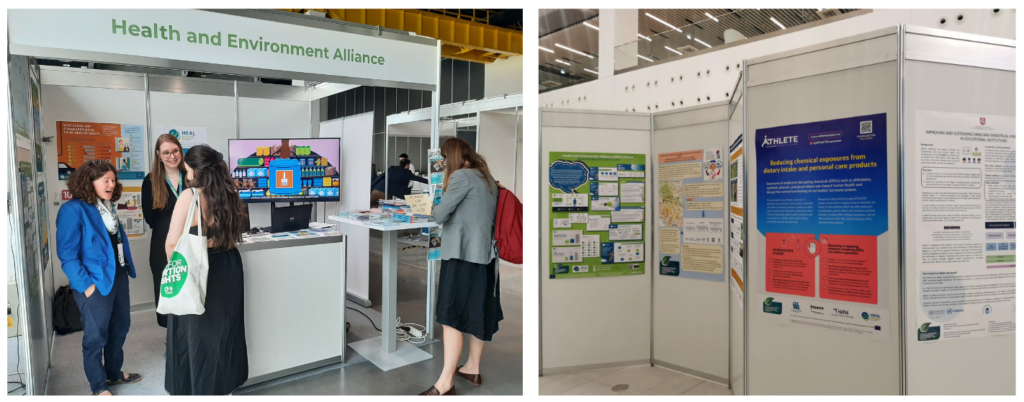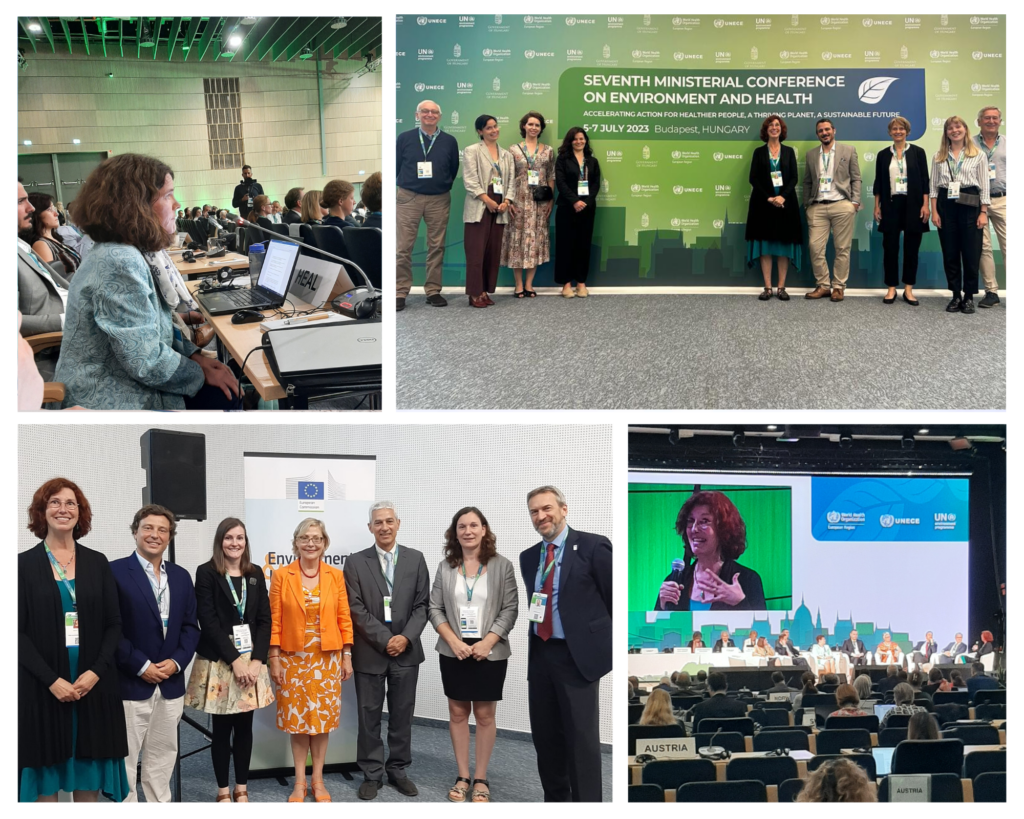The Green 10 coalition, which HEAL is a part of, encourages the President of the European Parliament Roberta Metsola upon her re-election to put the climate, biodiversity and pollution emergency at the forefront of her tenure.
During the 7th Ministerial Conference on Environment and Health, organised by the World Health Organization (WHO) Regional Office for Europe, the Budapest Declaration to accelerate action for healthier people, a thriving planet and a sustainable future was adopted by health and environment ministers of countries of the WHO European region.
Members of HEAL’s Secretariat and representatives from over 10 HEAL member organisations participated in the Ministerial Conference to ensure health, patient, environmental and other civil society groups are part of steering the future health agenda for the WHO European region, in view of the triple crises of environmental pollution, climate change, and biodiversity loss. The red thread at the event was what Tedros Adhanom Ghebreyesus, WHO Director-General called for in the opening session: addressing the root causes of climate change, pollution and biodiversity loss, and preparedness for their impact: “We need to change the narrative. Changing from fossil fuels to renewables will help us tackle the root cause of climate change.” There was an understanding among many representatives of health and environment ministries at the event that the costs of inaction are high, and that greater commitment is needed in order to prevent disease and ill-health.
HEAL’s Executive Director Génon Jensen emphasised the urgency to speed-up national and European-wide political action to make zero pollution a reality in Europe in a high-level panel:
‘The health effects of pollution are compounding. We need zero harm from pollution, zero money for pollution and zero delay in stopping pollution. The polluters need to bear the costs of their actions. HEAL calls for ministers to step-up by banning harmful chemicals, ensuring people have clean air and cleaning-up existing pollution.’
Collaboration is key to address the triple environmental crisis of climate change, environmental pollution and biodiversity loss. As part of the conference, HEAL hosted a session with the European Commission’s Directorate-General (DG) for Research and Innovation, DG Environment, and the European Environment Agency (EEA) on the contribution of pan-European research collaboration to evidence-based zero pollution and health policy.
In a panel discussion moderated by HEAL’s Executive Director Genon Jensen, experts from four cross-cutting EU-funded research clusters highlighted their contribution to the implementation of science-based policy solutions to tackle the impact of environmental pollution on public health. The European Cluster on the Health Impacts of Micro- and Nanoplastics (CUSP), the umbrella research collaborative that also includes the POLYRISK project in which HEAL is a partner, presented their innovative work. Clustering can help develop robust methodologies for further studies, and grant a holistic picture of how people are exposed to micro- and nanoplastics in different geographical areas and across different professions and socio-economic contexts. This kind of cross-cutting EU-funded open access research is a crucial pathway for pollution and health impact monitoring that works as direct input on policy making.
Research results from the ATHLETE project, another research project HEAL is involved in, were showcased at the conference through participation in the official WHO poster exhibition.Two comprehensive posters explained the core concepts behind research into the Human Exposome, which will increase our understanding of how the totality of environmental exposures can impact human health from pregnancy to adolescence over a lifetime. Another reviewed studies on interventions that aim to reduce chemical exposures from dietary intake and personal care products. Additionally HEAL member Mutalites Libres and HEAL presented a poster showcasing an awareness raising campaign to prevent and reduce exposure to endocrine disrupting chemicals, which included a checklist of 10 ways to avoid harmful endocrine disrupting chemicals in homes.
Photo: Heal exhibition booth and ATHLETE poster at the event
During the event HEAL staff had opportunities to make interventions on the floor to address the ministers on site. To this end HEAL Deputy Director Anne Stauffer called for decision makers to address the crisis we face holistically: “The diagnosis on the urgency to act on the triple crisis is clear. The much needed transformation for zero pollution, climate neutrality, biodiversity protection needs to happen in this decade, not in 2050. This change for a healthy planet & healthy people will bring huge benefits, not only for individuals, but also for economies”
Weronika Michalak, HEAL Poland Director, discussed the need for urgent action to phase-out fossil fuels and called for the decision makers on site to take action: “The evidence on the health threats of global heating is clear – and air pollution makes health impacts from heat worse. We need to phase out fossil fuels and go beyond coal – especially in the case of Poland, and we need to become climate neutral by 2040 at the latest.”
HEAL members present at the event were European Federation of Allergy and Airways Diseases Patients’ Associations, International Society of Doctors for Environment Italy, the INCHES network, Réseau Environnement Santé, Women Engage for a Common Future International, the European Respiratory Society, the European Public Health Alliance, the London School of Hygiene and Tropical Medicine, Armenian Women for Health and Healthy Environment, the Institute of Public Health of Serbia, Clean Air Action Group Hungary (Levegő Munkacsoport), and the Slovenian Institute for Health and Environment. HEAL’s pioneering members engaged in interventions, presented posters and spoke at plenaries and parallel sessions during the conference.
Photo: Clockwise from top left: intervention by HEAL Deputy Dirextor Anne Stauffer, HEAL Delegation at the WHO 7th Ministerial Conference on Health, side-event panellists and HEAL Executive Director Génon Jensen presenting.
The Adoption of the Budapest Declaration on Environment and Health, to which HEAL provided expertise as a member of the European Environment and Health Task Force (EHTF), was signed by ministers and representatives from the WHO European Region, with only Russia withdrawing. The declaration aims to accelerate the just transition towards resilient, healthy, equitable and sustainable societies, and prioritise action on health challenges related to climate change, pollution and biodiversity loss. In The European policy context the declaration will support the European Green Deal, the EU Global Health Strategy, the EU Chemicals Strategy for Sustainability, the EU Farm to Fork Strategy, the EU Research and Innovation Framework Programmes Horizon 2020 and Horizon Europe, the EU Regulation on serious cross-border health threats and the EU Beating Cancer Plan. A major outcome of the declaration are the “EHP Partnerships” as a new mechanism to accelerate these efforts by bringing together countries and other partners. Four partnerships were launched on human biomonitoring, health sector and climate action synergies, healthy mobility and youth collaboration.
HEAL welcomes the clear diagnosis of health threats and the commitment expressed in the Budapest Declaration. However, it is crucial that health and environment ministers now walk the talk, and establish time-bound and tangible goals to set the actions outlined in motion. In addition, they should step up in the implementation of the Budapest Declaration by taking action to phase out fossil fuels and to prevent pollution particularly on air, chemicals and pesticides, for everyone, but especially for those most vulnerable.
Find more information on the conference and the Budapest declaration on the Seventh Ministerial Conference Website. Explore HEAL’s twitter thread on day 1, day 2 and day 3 for a peek at the conference happenings.





